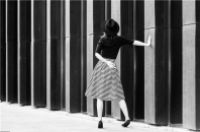
source:psychologytoday | by Vivian Diller Ph.D.
欲翻译的小伙伴,可评论『领稿』,并把已完成的译文『贴在评论』处或『发在自己的心理圈内』。请领稿的小伙伴,尽量在一个星期内完成翻译,谢谢!!~~
I started using the term "beauty self-esteem" after a journalist asked me to describe the psychological difference between attractiveness and beauty.
She asked, "Why do some people feel attractive even if they don"t have model-like features, whereas as others -- like some fashion models, onscreen actors and others known for their beauty — don"t necessarily feel that way?" I told the journalist physical features are only a part of what makes a person attractive, and her question was more about a person"s "beauty self-esteem."
You, too, might find this term useful in thinking about how you feel about your appearance. You see, attractiveness is more complicated than meets the eye, an issue I have written about in previous posts here. It is helpful to remember that beauty is both a physical and psychological experience. It is based on three qualities:
1) How we actually look (genetics)
2) How we take care of ourselves (health and grooming)
3) How we feel about how we look (positive self-regard)
The combination of these qualities is what I call "beauty self-esteem." Having one of them (good genes, for example) without the others (good grooming or positive self-regard) can lead to an inability to feel attractive regardless of how one appears to others.
This post is about ways to enhance "beauty self-esteem" using cognitive behavioral techniques. Keep in mind that I am not a beauty expert in the traditional sense — that is, I am not a style or fashion authority — and these are not beauty secrets that promise to change your life. I, like many of you, am tired of hearing those "how-to" tips in commercials, magazines, reality shows, books and blogs — have you Googled "beauty" lately? We have become so accustomed to being told what we need to fix that we forget that the whole notion of fixing actually detracts from feeling attractive.
Instead, as a psychologist, I believe feeling better about ourselves requires internal work, and that applies to our looks, as well. I help people identify their thoughts and feelings about their self-image and find realistic ways to improve upon them. To achieve that goal, we need to understand the cognitive-behavioral patterns we have about beauty, learn how to alter them and then use new ones to support our beauty self-esteem.
Below are three cognitive behavioral therapy (CBT) techniques applied to the experience of attractiveness, starting with common beliefs people have about beauty, followed by a behavioral technique that can be practiced to achieve change and ending with a cognitive shift that improves beauty self-esteem.
Exercise One
Cognitive Belief: People tend to believe that beauty is based on a reality created by others. The truth is that you can learn to define your self-image based on your own criteria rather than the reality created by your culture.
Behavior Pattern: Write down three physical features and three aspects of your personality that you like most. If you have a hard time coming up with any, try thinking of the features you are least critical of. For example, it could be, "I work hard, I like my eyes, I am honest, I am a loyal friend, I"m a good athlete and I have thick hair." Now put your list in order of importance and elaborate by writing one sentence about each aspect on your list.
Expected Change: If you are like most men and women who have made this list, you will likely see the physical features you wrote were ranked lower than ones about your personality. Although it may seem obvious, this exercise places physical beauty in perspective. It helps remind us that the core of our self-esteem is based on personality characteristics more often than our physical features -- even if our culture has us thinking otherwise. Physical beauty is just one aspect of our identity. Attractiveness is about much more.
Exercise Two
Cognitive Belief: Looks matter to most people, but many confuse attractiveness with perfection. Although no one truly looks perfect all the time in every way, it is a belief supported by our media-driven culture. We all have bad hair days, blemishes, bloating, etc., but airbrushing and Photoshop can magically make them disappear. You can learn to hold on to your "imperfect" core self-image — the sense of yourself that remains s regardless of imperfections — by acknowledging that variability is an inherent aspect of true attractiveness.
Behavior Pattern: This exercise focuses on your physical features. Write down three that you believe are most appealing to you. Again, if you find this difficult, chose the three features you find least unappealing or ones that others tell you are appealing to them. For example you might chose your curly hair, green eyes and white teeth. Describe each feature in a sentence, like, "My white teeth are attractive, especially when I smile." Use these to begin to identify the core of your beauty self-esteem.
Expected Change: Remember, no one has perfect features, but everyone has at least a couple of attractive ones. These can contribute to the core of your self-image. You can learn to use them for confidence and to improve your beauty self-esteem. If you have curly hair, bring attention to it by wearing cool hats. If you have nice eyes, wear clothes/makeup that bring out the color. Healthy teeth? Keep taking care of them and use your smile to feel good about your looks. If you alter the equation between perfection and beauty to a more realistic definition, the chances are you will be able to enhance your beauty self-esteem.
Exercise Three
Cognitive Belief: We are our own worst critics. Few people find as many faults with their appearance as we do. We can change the way we talk to ourselves by replacing negative thoughts and inaccurate "internal dialogues" with more positive, realistic ones.
Behavior Pattern: Look at yourself in the mirror and then listen to the words that come into your head. Ask yourself: Is the tone critical? Do the words remind you of anyone or sound similar to those your mom once said? Your dad? Siblings? Schoolmates? Then question the validity of these words. Are they really accurate? For example, do thick eyebrows truly make you look unattractive? Do the extra five pounds you carry mean you are fat? Now rewrite these dialogues as if you were talking to your friend, sister or daughter. If a friend asked you how she looked, what tone would you use? Look in the mirror and use that tone in an internal dialogue you have with yourself.
Expected Change: We can shift the way we see ourselves by practicing consistent, supportive internal dialogues. Instead of being critical and "fixing" ourselves, we can try to look the best we can and accept who we are. Use your own kinder, internal mirror as a constant source of beauty self-esteem and you will look and feel more attractive.
These are just some of the incorrect notions about beauty that have become hardwired into our thinking, but that can change by applying the cognitive behavior techniques. The result is a shift in our internal lens that builds — rather than fixes — long-term self-confidence and beauty self-esteem. We all deserve to feel positive regard toward ourselves, and we clearly can"t rely on our culture to make that happen. CBT has been shown to help people change attitudes, beliefs and behaviors. Why not apply this technique to change our approach to beauty?
Let me know how these three CBT techniques work for you. And if you have additional thought patterns that keep you from feeling good about your looks, let me know -- I can suggest exercises that may help change them, turning negative to positive and feeling unattractive to feeling beautiful.




